Eating beef was once so taboo in Taiwanese society that a traditional idiom warned that doing so would damn one’s soul to hell. Old people also warned children that consuming beef would make them stupid.
The prohibition made sense when Taiwan was a predominantly agricultural society since oxen and buffalo were integral to farming, and people refrained from eating them out of respect — just like they do with dogs today.
Some farmers still feel this way. In 2019, photographer Tsai Meng-hsing (蔡孟興) captured a tear-jerking moment when an old man kissed his long-time ox companion goodbye. The man had turned down multiple offers to sell the animal for meat, and finally decided to send him to a “retirement home” for bovines to live out its life peacefully.
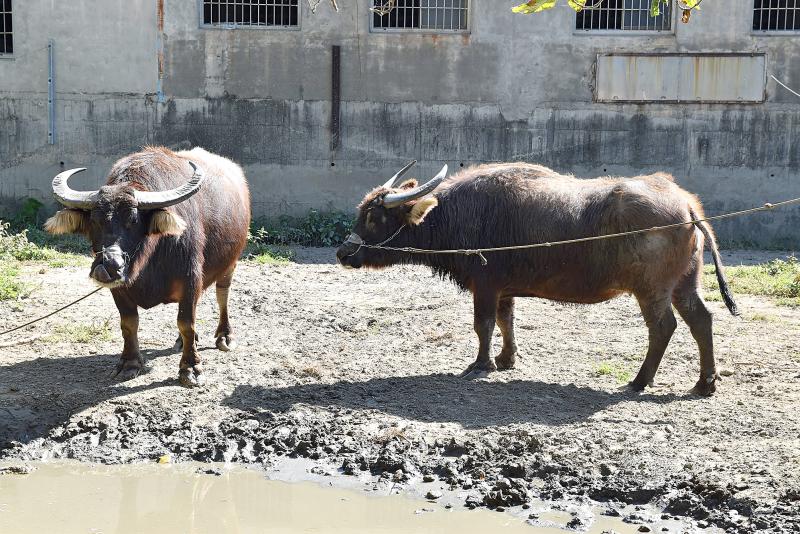
Photo: Huang Shu-li, Taipei Times
I stopped by one of these retirement homes in 2018 while reporting on an unrelated story, and it sure was a serene scene. And despite beef noodle soup being one of Taiwan’s signature dishes, many non-Buddhist, non-vegetarian locals I know don’t eat beef even though they have no farming background. They’re often reluctant to explain why or are unclear about the exact reason, merely citing “family reasons.”
A month into the Year of the Ox, it feels like a good time to explore the nation’s complex and colorful relationship with the animal, from early taboos to creepy legends to modern day rituals.
THE BUFFALO GENERAL
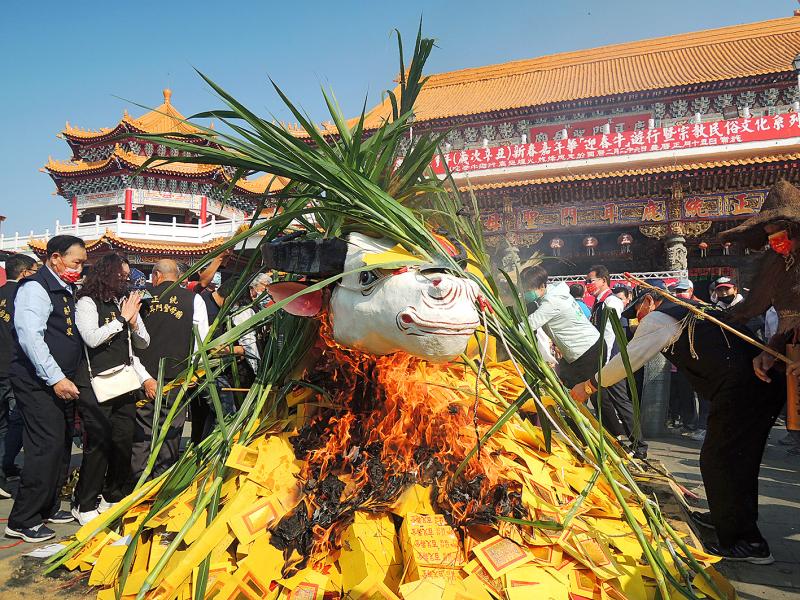
Photo: Wang Chu-hsiu, Taipei Times
The Japanese introduced the practice of eating beef to Taiwan after they took over in 1895. But it was also a relatively new practice to the colonizers, as they only started doing so after the Meiji Restoration in 1868, when the country rapidly adopted Western practices.
The trend didn’t really catch on in Taiwan, however, as beef noodle soup pioneers in the 1950s recall that they really had to persuade people to try the dish. When late independence activist Su Beng (史明) returned to Taiwan in 1993 after a four-decade absence, one of the changes that particularly stood out to him was that people were consuming beef.
The reverence of oxen was still evident after the Japanese set up a slaughterhouse in today’s Dalongdong (大龍峒) area in Taipei. Late historian Lin Heng-tao (林衡道) recalls that children were told to close their eyes and clasp their hands behind their back if they heard the cries of an ox when passing by. This was to ensure that when judgment time came in the afterlife, they could tell the king of the underworld that they didn’t save the ox because they couldn’t see and their hands were tied.
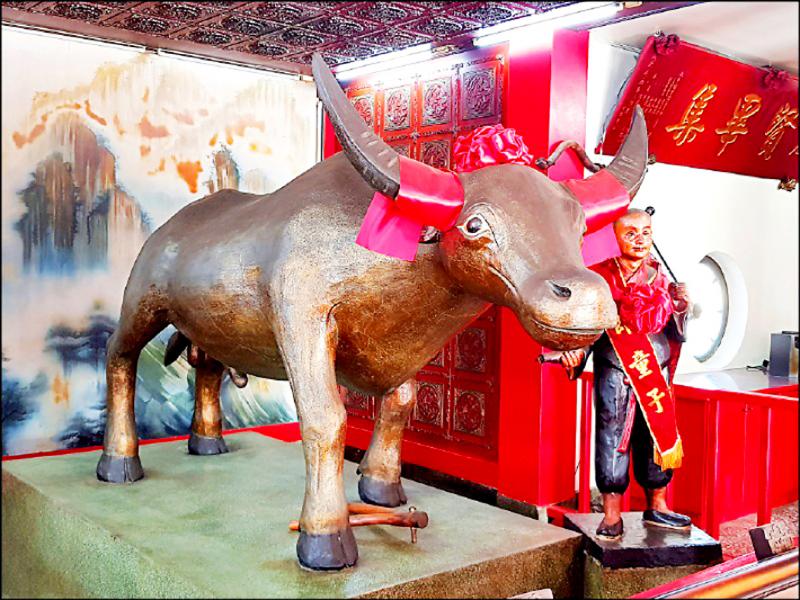
Photo courtesy of Wikimedia Commons
Despite this deep respect, there are no temples worshiping oxen in Taiwan, although there is one that has a “water buffalo general” (水牛將軍) as its main deity in Taibao City (太保), Chiayi County.
Visitors generally offer water, fruit, flowers, sugarcane and grass for the divine bovine. Last month on the first day of the Lunar New Year, believers eagerly waited for the temple to open so they could rub the wooden buffalo-general statue for good fortune.
“Rub the head and you’ll be rich enough to build a palace,” says temple official Chen Tsung-chin (陳宗欽), according to a report in the Liberty Times (the sister paper of the Taipei Times). “Rub the horns for a steady cash flow. Rub the ears so your wallet will bulge. Rub the shoulders and you’ll have a living room full of cash. Rub the balls and you’ll become a billionaire. Rub the belly so your pockets will overflow. Rub the tail and your savings will soar. Rub the hooves and your parents will be provided for. Rub the length of the back and you’ll be rolling in cash all year.”
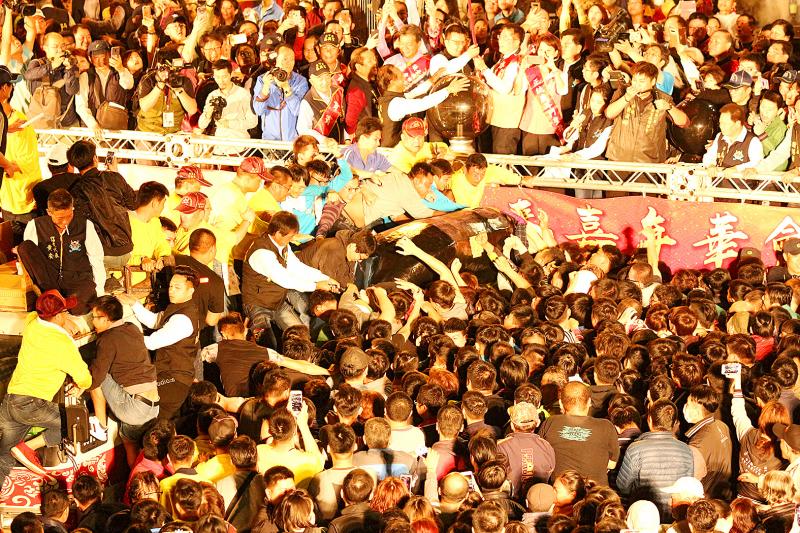
Photo: Wang Chu-hsiu, Taipei Times
An exaggeration? Perhaps, but it pleases the crowd.
The animal also features in a feared local legend: the human-faced talking ox who could predict the future. The creature itself was harmless, but it always forecast bad news. There are several recorded occurrences of this in Taiwan’s history. One instance even made national headlines: in December 1913, the Taiwan Daily News (台灣日日新報) reported that a human-faced calf appeared in today’s Sansia (三峽) and spoke of unrest in the following year. Seven months later, the anti-Japanese Liujia Incident (六甲事件) broke out in today’s Tainan.
TO EAT OR NOT TO EAT
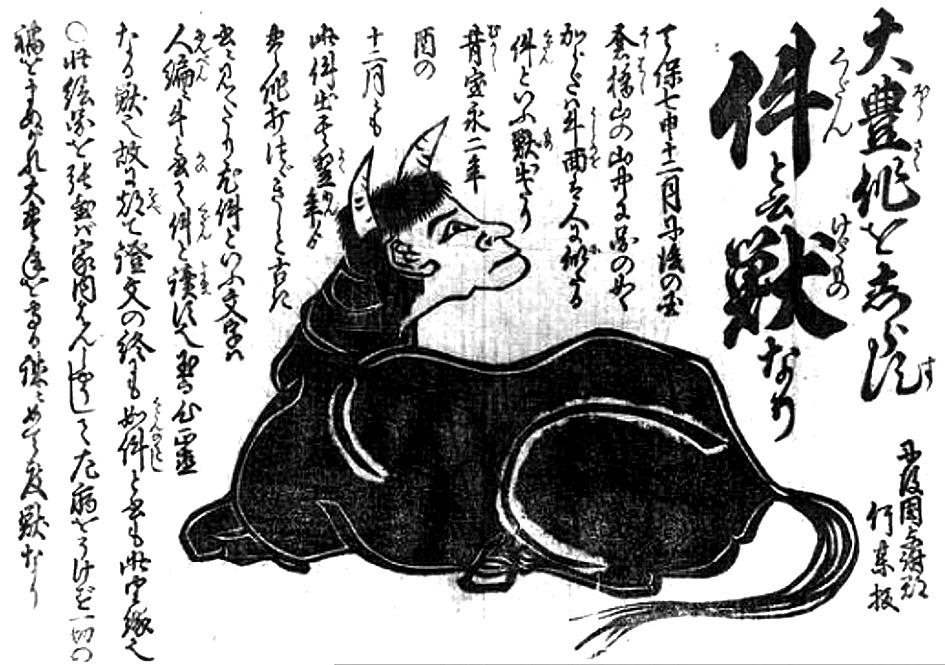
Photo courtesy of Wikimedia Commons
Despite the deep respect people had for oxen, beating or whipping the “spring ox” is another popular ritual for Taiwanese that continues today. It typically involves whipping an effigy of an ox or water buffalo to symbolize getting ready for the planting season after a winter of idleness. Yilan City’s Wugu Temple (五穀廟) even brings in a live water buffalo for people to rub while reciting similar sayings as Chiayi’s event.
Tainan’s Luermen (鹿耳門) Matsu Temple was known for its frenzied scene when, after the whipping, people fought for their lives to grab a piece of the paper ox for good luck. Last year, news reports show that they violently dismantled the paper effigy in 30 seconds. Due to the COVID-19 pandemic, however, this year the temple simply burned the ox and handed out its ashes in a pouch to believers.
Due to concerns over (symbolic) animal cruelty, some locales have modified their practices to fit with the times. In 2018, then-Tainan interim mayor Li Meng-yen (李孟諺) beat a drum with an ox illustration on it for the city’s official event.
A quick search on the Internet yields a plethora of discussions on people’s beef-eating habits. The most common reason not to eat beef today, aside from vegetarianism, appears to be: “the fortune teller told me not to eat it.” Many seem to have practiced this habit from early childhood after their parents brought them to a fortune teller who warned them to avoid beef due to their date and time of birth.
Fortune teller Yang Teng-ke (楊登嵙) corroborates this belief, but notes that only those born under the Kui Gang Star (魁罡星) according to Chinese astrology should avoid eating beef; others need not worry. Another saying is that since the Taoist deity Wenchang Dijun (文昌帝君), the god of academics and career, rides an ox, eating the animal will bring bad luck in those areas.
Some strictly swear by the taboo, noting that bad things happen whenever they accidentally ingest beef, while others claim that it’s just a myth.
Last year, Mirror Media (鏡週刊) ran a story of a man in Tainan named Shen Ta-yu (沈大裕), who was born under the Kui Gang Star but opened a beef hotpot store to pay off his massive debts. His business boomed and 15 years later, he was debt free.
“My fate told me to avoid beef, but I purposely went against the heavens,” he says.

Dissident artist Ai Weiwei’s (艾未未) famous return to the People’s Republic of China (PRC) has been overshadowed by the astonishing news of the latest arrests of senior military figures for “corruption,” but it is an interesting piece of news in its own right, though more for what Ai does not understand than for what he does. Ai simply lacks the reflective understanding that the loneliness and isolation he imagines are “European” are simply the joys of life as an expat. That goes both ways: “I love Taiwan!” say many still wet-behind-the-ears expats here, not realizing what they love is being an

Google unveiled an artificial intelligence tool Wednesday that its scientists said would help unravel the mysteries of the human genome — and could one day lead to new treatments for diseases. The deep learning model AlphaGenome was hailed by outside researchers as a “breakthrough” that would let scientists study and even simulate the roots of difficult-to-treat genetic diseases. While the first complete map of the human genome in 2003 “gave us the book of life, reading it remained a challenge,” Pushmeet Kohli, vice president of research at Google DeepMind, told journalists. “We have the text,” he said, which is a sequence of

Every now and then, even hardcore hikers like to sleep in, leave the heavy gear at home and just enjoy a relaxed half-day stroll in the mountains: no cold, no steep uphills, no pressure to walk a certain distance in a day. In the winter, the mild climate and lower elevations of the forests in Taiwan’s far south offer a number of easy escapes like this. A prime example is the river above Mudan Reservoir (牡丹水庫): with shallow water, gentle current, abundant wildlife and a complete lack of tourists, this walk is accessible to nearly everyone but still feels quite remote.

It’s a bold filmmaking choice to have a countdown clock on the screen for most of your movie. In the best-case scenario for a movie like Mercy, in which a Los Angeles detective has to prove his innocence to an artificial intelligence judge within said time limit, it heightens the tension. Who hasn’t gotten sweaty palms in, say, a Mission: Impossible movie when the bomb is ticking down and Tom Cruise still hasn’t cleared the building? Why not just extend it for the duration? Perhaps in a better movie it might have worked. Sadly in Mercy, it’s an ever-present reminder of just